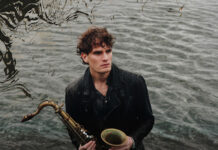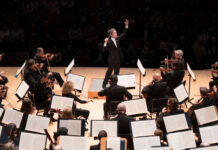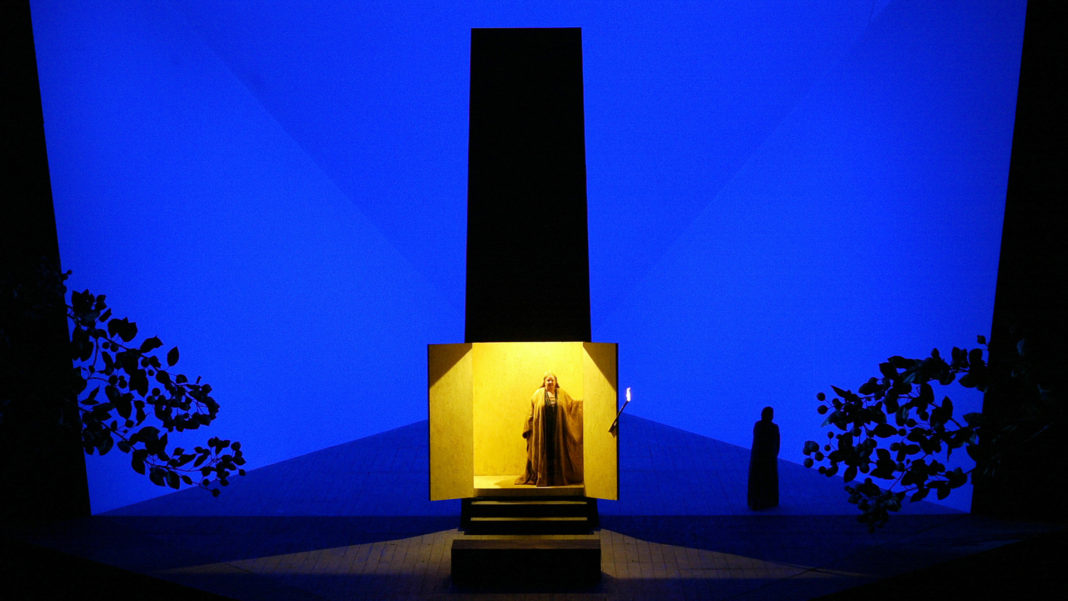Week 17 at the Met finds four huge crowd-pleasing operas sharing the week with a much lesser-known opera from 1914, one of Tchaikovsky’s operas and my personal favorite, Wagner’s Tristan und Isolde.
As you know, the Met Opera is making each production available on their website beginning at 7:30 PM EDT/4:30 PM EDT. They remain available for 23 hours of free viewing. The schedule and start times are subject to change.
If you read this column early enough, you might still catch Rossini’s La Donna del Lago before it becomes unavailable at 6:30 PM EDT/3:30 PM PDT on Monday, July 6th.
Here is the line-up for Week 17 at the Met:
Monday, July 6 – Puccini’s La Bohème
Conducted by Marco Armiliato; starring Sonya Yoncheva, Susanna Phillips, Michael Fabiano, Lucas Meachem, Alexey Lavrov, Matthew Rose and Paul Plishka. This is a revival of Franco Zefferelli’s 1963 production from the 2017-2018 season.
Easily one of the most popular operas in the world, Giacomo Puccini’s La Bohème had its world premiere in Turin, Italy in 1896. The libretto is by Luigi Illica and Giuseppe Giacosa. The opera is based on Henri Murger’s 1851 novel, Scènes de la vie de bohème.
The story centers on four friends who are unable to pay their rent. Successfully getting out of a potentially bad situation with their landlord, all but one go out on the town. Rodolfo stays home and meets a young woman named Mimi. They fall in love, but Mimi’s weakness may be a sign of something far more life-threatening than they know. (If this sounds like the musical Rent, it is because La Bohème served as Jonathan Larson’s inspiration for that musical.)
This production had multiple casts during this season’s performances. Yoncheva was the third person to sing Mimi (following Angel Blue and Anita Hartig). Phillips was the second woman to sing the role of Musetta. Fabiano was the fourth person to sing the role of Rodolfo (following Dmytro Popov, Jean-Francois Borras and Russell Thomas).
Tuesday, July 7 – Verdi’s Il Trovatore
Conducted by James Levine; starring Éva Marton, Dolora Zajick, Luciano Pavarotti and Sherrill Milnes. This Fabrizio Melano production is from the 1988-1989 season.
Giuseppe Verdi’s Il Trovatore is based on the play El trovador by Antonio García Gutiérrez published in 1836. The libretto was written by Salvadore Cammarano with additions by Leone Emanuele Badare. The opera had its world premiere in Rome in 1853.
The setting is Zaragoza, the capital of the Kingdom of Aragon, circa 1412. To offer up a quick synopsis here would be a fool’s game to play. Several stories happen simultaneously and sometimes share the same characters. The opera has rarely been hailed for its story, but it certainly ranks as one of Verdi’s finest compositions.
When this production first opened that season at the Metropolitan Opera, Joan Sutherland sang the role of Leonora and Richard Bonynge was conducting. Pavarotti sang the role of Manrico throughout. While critics were not so keen on Melano’s direction, Donal Henahan, writing for the New York Times, liked much of Pavarotti’s performance.
“Mr. Pavarotti was in good vocal health, immediately making ears prick up with his offstage song in the duel scene. Later, his ‘Ah, si, ben mio’ was meltingly ardent and unmistakably the work of a genuine lyric tenor. In the opera’s most famous aria, ‘Di quella pira,’ his voice simply lacked the bite and thrust required for this showpiece of the Italian robust tenor.”
Wednesday, July 8 – Mozart’s Così fan tutte
Conducted by James Levine; starring Susanna Phillips, Isabel Leonard, Danielle de Niese, Matthew Polenzani, Rodion Pogossov and Maurizio Muraro. This is a revival of Lesley Koenig’s 1996 production from the 2013-2014 season.
Mozart’s Cosí fan tutte had its world premiere in Vienna in 1790. Lorenzo Da Ponte, who wrote the libertti for The Marriage of Figaro and Don Giovanni, wrote the libretto.
Ferrando and Guglielmo are vacationing with their fiancées, Dorabella and Fiordiligi. They are sisters. Don Alfonso challenges the men to a bet revolving around the women and their ability to be faithful. Using disguise, deception and a wicked sense of humor, Mozart’s opera ends happily ever after for one and all.
What made this particular production memorable for the Metropolitan Opera and its fans is it marked the return of James Levine to the podium after a nearly two-and-a-half year absence due to health issues. (This was, of course, before other issues would force him to leave the Met Opera completely.)
Thursday, July 9 – Zandonai’s Francesca da Rimini
Conducted by Marco Armiliato; starring Eva-Maria Westbroek, Marcello Giordani and Mark Delavan. This is David Kneuss’s re-working of the 1984 Piero Faggioni production from the 2012-2013 season.
Riccardo Zandonai is not the best known of composers nor are his works regularly performed. Francesca da Ramini is his most popular work. The opera had its world premiere in Turin in 1914. The libretto was written by Tito Ricordi. Gabriele d’Annunzio’s play Francesca da Rimini was the source material that inspired this opera.
The title character, Francesca, is set to marry Giovanni (who is known by his nickname, Gianciotto.) When she is introduced to his brother, Paolo, she believes this man to be her groom. He falls in love with her, but has conspired to take Francesca away from his brother. Sibling rivalry significantly intensifies when Gianciotto’s youngest brother, Malatestino, gets involved.
This production marked the first time in over a quarter century since the Met had performed Francesa da Rimini. Steve Smith, writing for the New York Times said of Zandonai’s music, “…his musical language, though grounded in Italian lyricism, bears traces of Tristan und Isolde, Pelléas et Mélisande and Der Rosenkavalier.” But he concluded his review with two words, “Still – why?”
Friday, July 10 – Tchaikovsky’s Eugene Onegin
Conducted by Valery Gergiev; starring Anna Netrebko, Piotr Beczała, Mariusz Kwiecień and Alexei Tanovitski. This Deborah Warner production directed by Fiona Shaw is from the 2013-2014 season.
Pyotr Ilyich Tchaikovsky was inspired by Alexander Pushkin’s verse novel of the same name for this opera that had its world premiere in Moscow in 1879. The composer co-wrote the libretto (using much of Pushkin’s text as written) with Konstantin Shilovsky.
Onegin is a rather selfish man. Tatyana expresses her love for him, but he rejects her saying he isn’t suited to marriage. By the time he comes to regret the way he treated her, he has also come to regret the actions that lead to a duel that killed his best friend.
You may be asking why two people are credited with this production. Warner had to leave Eugene Onegin in August of 2013 to have surgery. She asked Shaw to come in at the last minute to take over prior to the opening night in September.
Additionally there was controversy surrounding the production due to Gergiev and Netrebko’s support of Vladimir Putin. This was three months after Putin had signed into law a ban on “propaganda on nontraditional sexual relationships.”
Saturday, July 11 – Puccini’s Madama Butterfly
Conducted by Pier Giorgio Morandi; starring Hui He, Elizabeth DeShong, Bruce Sledge and Paulo Szot. This is a revival of the 2006 Anthony Minghella production from the 2019-2020 season.
Puccini’s Madama Butterfly is every bit as popular as La Bohéme. Luigi Illica and Giuseppe Giacosa wrote the libretto based on John Luther Long’s short story, Madame Butterfly and on the 1887 French novel Madame Chrysanthème by Pierre Loti. David Belasco turned Long’s story into the play Madame Butterfly: A Tragedy in Japan. Puccini saw the play in 1900 in London. His opera had its world premiere in 1904 at La Scala in Milan.
Cio-Cio San falls in love with an Lieutenant in the U.S. Navy named Pinkerton while he is stationed in Japan. They hold a wedding ceremony that Cio-Cio San takes very seriously. When Pinkerton has orders to go back to the States, she awaits his return. Unbeknownst to Pinkerton, Cio-Cio San has gotten pregnant and given birth to a son. When he finally does return with his American wife, Cio-Cio San is devastated. (If this sounds like the musical Miss Saigon, it is because Madama Butterfly served as the inspiration for that musical.)
In this production of Madama Butterfly the role of Cio-Cio San’s son is portrayed utilizing bunraku puppetry, a form of traditional Japanese puppet theatre dating back to the 17th century.
Sunday, July 12 – Wagner’s Tristan und Isolde
Conducted by James Levine; starring Jane Eaglen, Katarina Dalayman, Ben Heppner, Hans-Joachim Ketelsen and René Pape. This Dieter Dorn production is from the 1999-2000 season.
Richard Wagner wrote the music and the libretto for Tristan and Isolde. Gottfried von Strassburg’s novel, Tristan, from the 12th century, serves as his inspiration. The opera had its world premiere in Munich in 1865.
It is a bit of oversimplifying to say that the story in Tristan und Isolde is about two lovers whose passion for each other is so strong, it can only truly thrive in the afterlife. But frankly, in a nutshell, that’s the essential premise. But don’t be mistaken, this is pure drama and glorious music.
Bernard Holland, writing for the New York Times loved this production. He praised the two leads saying “I wonder if we’ve ever had better ones.” He raved about the orchestra saying, “The heart of Tristan is its orchestra, and James Levine worked in slow, patient accumulations of force. The sound was wonderful.” And concluded his review by stating, “There is no other music like it, and I have never heard a better performance.”
Tristan und Isolde is easily my personal favorite opera. I’ve seen productions in the United States and in Europe. I find it profoundly moving on all levels. What Wagner accomplished here by not resolving the music until the final minutes of the opera is without parallel. I plan to watch this production and encourage you to do the same.
That’s the list for Week 17 at the Met. I hope you enjoy yourselves at the opera!
Photo: A scene from Act 2 of Tristan und Isolde (Photo by Ken Howard/Courtesy of the Metropolitan Opera)











